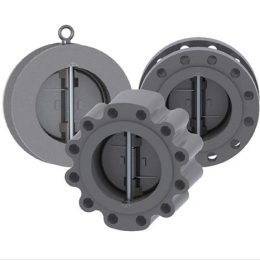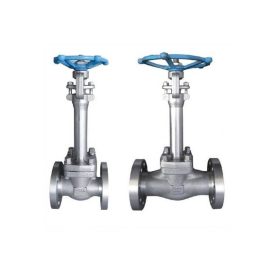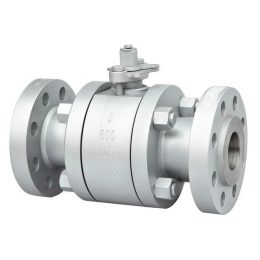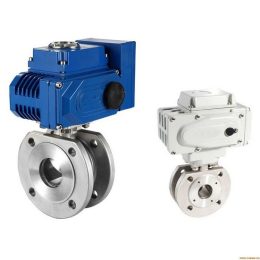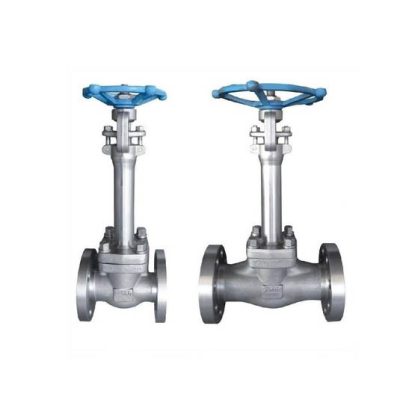
Cryogenic Gate Valve
Introduction
The Cryogenic Gate Valve is a type of shut-off valve used for connecting or isolating media in pipelines. It’s specially designed to handle cryogenic media such as methane, liquid natural gas, alkene, carbon dioxide, liquid ammonia, liquid oxygen, liquid nitrogen, and liquid hydrogen. This valve is appropriate for medium and large diameter pipelines and has a body made of high-grade ductile black cast iron which reduces its weight by approximately 20%-30% compared to conventional gate valves. The valve’s flat bottom design minimizes debris accumulation and allows for smooth fluid flow. The gate plate is made of high-quality rubber, ensuring precise geometry and firmly attached to the ductile cast gate plate, providing good elastic memory and preventing detachment.
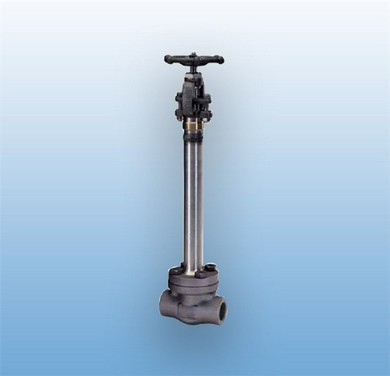
Cryogenic Gate Valve
Technical Specifications:
| Description | Specification |
|---|---|
| Sizes | NPS 1/2 to NPS 48 |
| Pressure Class | Class 150 to 2500 |
| Casting Materials | A216 WCB, WC6, WC9, A350 LCB, A351 CF8, CF8M, CF3, CF3M, A995 4A, A995 5A, A995 6A |
| Forging Materials | A182 F304, F3304L, F316, F316L, A182 F51, F53, A350 LF2, LF3, LF5 |
| Other Materials | Inconel, Hastelloy, Monel |
| Bore | Full or Reduced |
| End Connections | RF, RTJ, or BW |
| Stem | Outside Screw & Yoke (OS&Y), rising stem |
| Bonnet | Bolted Bonnet or Pressure Seal Bonnet |
| Wedge | Flexible or Solid |
| Seat Rings | Renewable |
Design Standard
Design & manufacture according to API 600, API 603, ASME B16.34
Face-to-face according to ASME B16.10
End Connection according to ASME B16.5 (RF & RTJ), ASME B16.25 (BW)
Test & inspection according to API 598
Also available per NACE MR-0175, NACE MR-0103, ISO 15848, API624
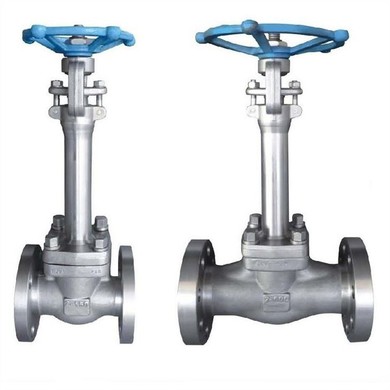
Applications
Cryogenic gate valves are an essential component in a variety of industries. In the aerospace sector, these valves are used to fuel rockets and satellites, allowing them to travel to space. In the medical equipment industry, cryogenic gate valves are used for storing and transporting biological samples and vaccines, ensuring that they are kept at the correct temperature. Cryogenic gate valves are also utilized in the energy sector for liquefied natural gas (LNG) production and transportation, where they play a critical role in ensuring the safety and efficiency of the process. Furthermore, in the food and beverage industry, these valves are used for freezing and chilling food products, maintaining their quality and freshness.
In addition to their use in these industries, cryogenic gate valves are also essential in laboratory applications. They are commonly used for handling liquid helium and other cryogenic fluids, which require precise temperature control to prevent contamination and ensure accurate measurements. Cryogenic gate valves play a crucial role in maintaining the integrity of experiments and ensuring reliable results.
Advanstages
Our Cryogenic Gate Valve offers several advantages over traditional gate valves. Its body is constructed with high-grade ductile black cast iron, reducing its weight by approximately 20%-30%. The valve’s flat bottom design diminishes debris accumulation and provides for a smooth fluid flow. The gate plate is crafted from high-quality rubber, ensuring precise geometry and securely attached to the ductile cast gate plate, offering good elastic memory and preventing detachment. Furthermore, our valves are engineered to meet the highest standards of quality and reliability, and we strive to provide our customers with exceptional service and support.
Maintenance and Safety
Proper maintenance of cryogenic gate valves is essential to ensure their safe and efficient operation. Regular inspections and cleaning of the valve components are required to prevent contamination and damage to the valve. Safety precautions must also be taken when working with cryogenic fluids, including the use of protective gear and adherence to established safety procedures.Discover the features and benefits of Cryogenic Gate Valve for handling cryogenic media. Learn about its technical specifications, applications, and maintenance for safe and efficient operation.
Q&As
Q: What is the Cryogenic Gate Valve used for?
A: The Cryogenic Gate Valve is used for connecting or isolating media in pipelines, and it’s specifically designed to handle cryogenic media such as methane, liquid natural gas, alkene, carbon dioxide, liquid ammonia, liquid oxygen, liquid nitrogen, and liquid hydrogen.
Q: What materials is the Cryogenic Gate Valve made of?
A: The Cryogenic Gate Valve has a body made of high-grade ductile black cast iron which reduces its weight by approximately 20%-30% compared to conventional gate valves. The valve’s gate plate is made of high-quality rubber, ensuring precise geometry and firmly attached to the ductile cast gate plate, providing good elastic memory and preventing detachment.
Q: What are the technical specifications of the Cryogenic Gate Valve?
A: Here are the technical specifications of the Cryogenic Gate Valve:
| Description | Specification |
|---|---|
| Sizes | NPS 1/2 to NPS 48 |
| Class | 150 to Class 2500 |
| Casting Materials | A350 LCB, A351 CF8, CF8M, CF3, CF3M, A995 4A, A995 5A, A995 6A |
| Forging Materials | A182 F304, F304L, F316, F316L, A182 F51, F53, A350 LF2, LF3, LF5 |
| Other Materials | Inconel, Hastelloy, Monel |
Q: How do you maintain and ensure the safety of the Cryogenic Gate Valve?
A: Proper maintenance of cryogenic gate valves is essential to ensure their safe and efficient operation. Regular inspections and cleaning of the valve components are required to prevent contamination and damage to the valve. Safety precautions must also be taken when working with cryogenic fluids, including the use of protective gear and adherence to established safety procedures.
I hope this helps! Let me know if you have any other questions or if there’s anything else I can assist you with.
- Gate Valves Can Be Classified In Two Ways
- Casted Gate Valve
- Maintenance of natural gas pipeline ball valve and common troubleshooting methods
- Insights on Metal-Seated Trunnion Ball Valves: 10 Must-Knows
- Efficient Flow Control with Forged Trunnion Ball Valve
- The Main Structural Characteristics and Operation of the Fixed Ball Valve
